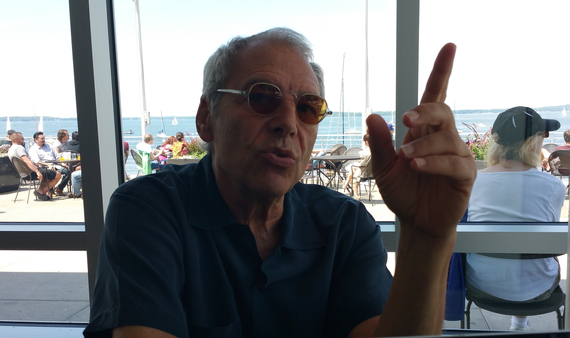At the glamorous waterside student union on the campus of the University of Wisconsin, 50 feet from where he first played with Steve Miller and Boz Scaggs back in the '60s, Madison-based jazz artist Ben Sidran gazed out at the summer crowds exuding satisfaction and serenity. No regrets.
"They were obviously seizing the moment," said the Chicago-born keyboardist
of his former bandmates who went on to fame and fortune in the rock world. "They were in the right place at the right time. But I was just not drawn to it. Aesthetically I wasn't drawn to it."
Sidran considered "white-kid rock-and-roll" to be boring. "This music did not exist in the real world like the blues did. This was manufactured stuff," he recalled without the slightest twist of making lemonade.
Although he spent some time on the West Coast recording and writing popular music, that world never fit him. The self-actualized troubadour opted out of the theatrics of pop music and all its accompanying glory and set out on a lifetime mission to understand the world. "I didn't care about changing it or any of that stuff," he said. "I just wanted to figure out 'How did I get here?' and 'How did we get here?' and 'What are we supposed to be doing?'"
With a state of mind like that, it's no surprise Sidran's latest album "Blue Camus" marries jazz and philosophy. It's Leonard Cohen meets Ken Nordine.
The grooves are accessible. The poetry existential yet unpretentious. "To the stranger, YOU'RE the stranger.... To the other guy, YOU'RE the other guy," goes one of his spoken-word passages, a sly nod to one of the best-known works of Albert Camus.
"In this country, we're interested in product. So everything's reduced to the product at hand, and everything I'm saying to you right now would be a digression from that," he observed. "I continue to put out CD's to have a reason to come and talk to people. And 'Blue Camus' obviously was designed to be in your face, philosophical, grooved, and from a European tradition."
With his wife Judy as the perfect ballast to his river-of-consciousness expressions - bounding from his experience in the Paris riots of 1968 back to his placid childhood in Racine, Wisconsin - Sidran has the bearing of a sexy sage. In addition to playing music, he found time to write three or four books and served as host of a jazz program on NPR.
After parting ways with Miller and Scaggs and graduating from the University of Wisconsin, he pursued a course in American Studies at the University of Sussex. Why go to England to study American culture? "Perspective," he said. "And back here, you know, in the '60s, there were no American Studies programs except Yale, and Sussex had the advantage of being out of the country, so I was further away from the draft boards."
Draft-dodging aside, Sidran's time in Sussex was fruitful. He earned a PhD, and his dissertation, a study of African-American music, was published as a book entitled Black Talk: How the Music of Black America Created a Radical Alternative to the Values of Western Literary Tradition.
Sidran on Jazz, the award-winning jazz program he hosted for NPR, resulted in an exhaustive 24-CD collection featuring interviews with 60 of the world's greatest jazz artists.
None of Sidran's records has topped the sales charts in league with rock legends. And "Blue Camus" defies formula. Meanwhile Black Talk sells two or three thousand copies a year in Germany yet doesn't have as much presence in the U.S. But that isn't what drives him. "Today money is everything to everybody. But back then, we never thought about money, you know. That was just not a factor," he reminisced. "And when you tell it to kids today, it sounds like we're describing a time when we lived in Disneyland or something."
Ben Sidran will play at Chicago's storied Capone-era jazz bar The Green Mill in September.
Michael Lynn contributed to this report, Part 1 of a 2-part series.
"If you don't say what you want, want whatcha say, hangin' in the cut between avant and passé."


